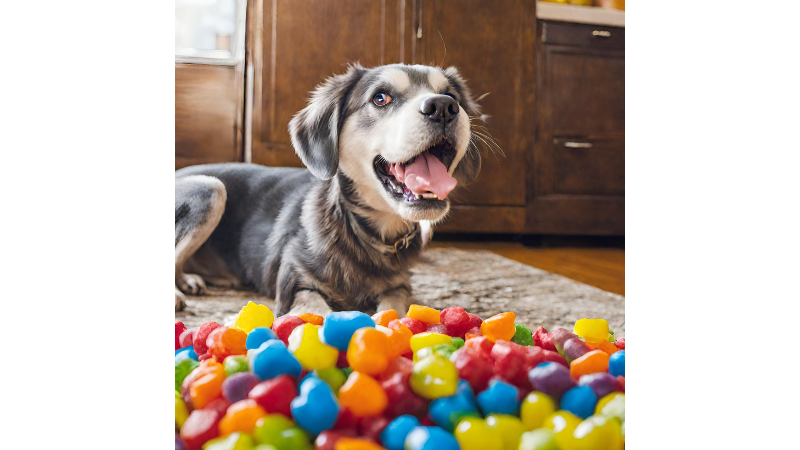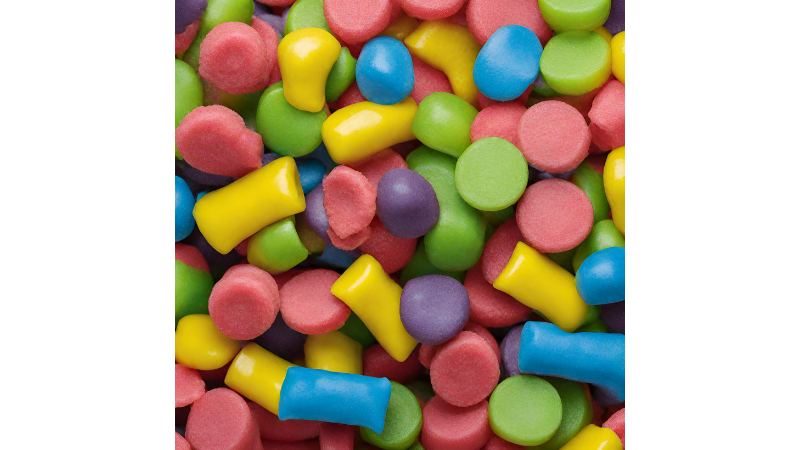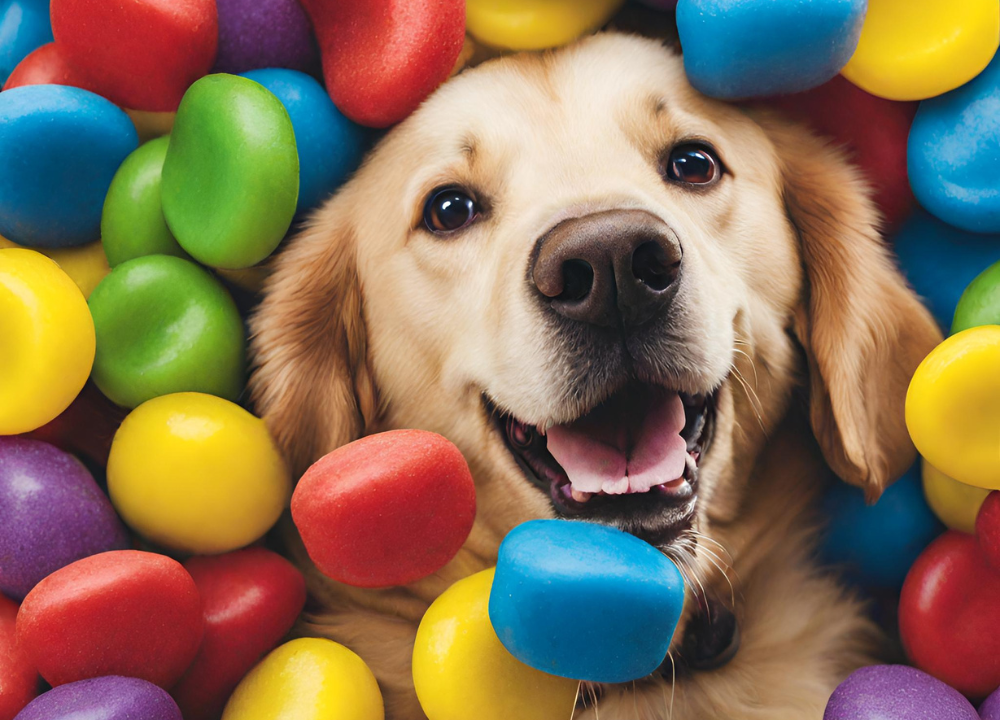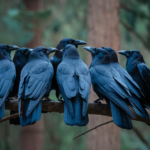As dog owners, we often consider our pets part of the family. Whether it’s sharing our space, our time, or even our food, we want to involve our furry friends in every part of our lives. But when it comes to sharing snacks, not all human foods are safe for dogs. A common question many pet owners ask is, “Can dogs eat Gushers?”
Gushers, the popular fruit-flavored snacks many of us enjoy, might seem like a harmless treat to share with your dog. However, there are reasons to be cautious. In this article, we’ll explore why Gushers aren’t a good choice for dogs, the potential health risks, and what to do if your dog accidentally eats one. We’ll also talk about healthier, dog-friendly alternatives. So, let’s dive in!
What Are Gushers?
Gushers are a type of fruit-flavored snack loved by kids and adults alike. They have a liquid-filled center and are often packed with sugar, artificial flavors, and food coloring. While Gushers might be fun for humans, it’s important to remember that these snacks are created specifically for people, not pets.
What’s Inside Gushers?
Here’s a quick look at the main ingredients found in Gushers:
- Sugar: Gushers are loaded with sugar, which can cause health issues for dogs.
- Corn syrup: Another sweetener that’s high in calories and has no nutritional value for dogs.
- Artificial flavors and colors: These ingredients make Gushers tasty and colorful, but they aren’t good for dogs.
- Preservatives: Used to extend the shelf life of the snack, preservatives can sometimes cause allergic reactions in sensitive dogs.
While all of these ingredients are safe for humans in moderation, they’re not good for dogs. In fact, some of them could be harmful.
Are Gushers Safe for Dogs?
The short answer is no, dogs should not eat Gushers. While a small amount of Gushers might not immediately harm your dog, they can pose several risks over time. Here’s why Gushers aren’t a good idea for your dog’s diet.
1. High Sugar Content
Dogs don’t need added sugar in their diet. Gushers are packed with sugar, which can lead to weight gain, obesity, and even diabetes in dogs. Over time, too much sugar can also cause dental problems, including cavities and gum disease. Unlike humans, dogs don’t handle sugar well, and sugary snacks like Gushers can cause more harm than good.
2. Artificial Ingredients
Gushers contain a range of artificial flavors and colors. While these make the treats more appealing to humans, they can be harmful to dogs. Some dogs may have allergic reactions to artificial ingredients, which can lead to symptoms such as itching, redness, or even vomiting.
3. Harmful Additives
In addition to sugar and artificial ingredients, Gushers contain preservatives and other additives to keep them fresh. Some of these substances are not safe for dogs, especially in large quantities. Dogs that eat processed foods like Gushers regularly may face long-term health risks, including liver and kidney problems.
What Happens If a Dog Eats Gushers?

Accidents happen, and if your dog manages to get their paws on a Gusher (or several), it’s important to know what to expect and how to respond.
Immediate Symptoms
If your dog eats Gushers, they might experience some mild symptoms, especially if it was only a small amount. Watch out for:
- Upset stomach: Your dog may have diarrhea or vomit after eating something sugary or processed like Gushers.
- Lethargy: Sugar can cause a spike in energy followed by a crash, leaving your dog feeling unusually tired.
- Hyperactivity: Some dogs may become temporarily hyperactive after consuming sugar, which can lead to unusual behavior.
When to Call the Vet
If your dog ate a large number of Gushers or you notice more serious symptoms such as continuous vomiting, severe diarrhea, or signs of distress, it’s a good idea to call your vet. In some cases, dogs may have a stronger reaction to the ingredients in Gushers, particularly if they have a sensitive stomach or existing health issues.
Here are some signs that you should call your vet immediately:
- Extreme lethargy or weakness.
- Trembling or shaking.
- Unresponsiveness or confusion.
- Difficulty breathing.
These symptoms may suggest that your dog is having a more serious reaction to the ingredients, and they should be checked out by a professional.
Healthier Alternatives to Gushers for Dogs

While it might be tempting to share your snacks with your dog, it’s always better to offer them something that’s safe and nutritious. Luckily, there are plenty of dog-friendly alternatives to Gushers that can satisfy your dog’s cravings without putting their health at risk.
1. Fresh Fruits (Dog-Safe)
Some fruits are not only safe for dogs but also packed with vitamins and nutrients. Here are a few you can offer your pet:
- Apples (without seeds)
- Blueberries
- Bananas
- Watermelon (seedless)
- Strawberries
2. Vegetable Snacks
Vegetables can be a great, low-calorie snack for dogs. Try offering:
- Carrots: Crunchy and great for your dog’s teeth.
- Cucumbers: Hydrating and low in calories.
- Green beans: A good source of fiber.
3. Homemade Dog Treats
If you want to treat your dog to something special, consider making homemade dog treats. You can control the ingredients and ensure they’re both healthy and tasty. Popular ingredients for homemade dog treats include:
- Pumpkin: Great for digestion.
- Peanut butter (unsalted and without xylitol): A favorite of many dogs!
- Oats: A healthy grain that’s easy on your dog’s stomach.
Are Any Human Snacks Safe for Dogs?
While it’s clear that Gushers aren’t safe for dogs, you might still wonder whether any human snacks are okay to share. The good news is that there are a few human foods that are safe for dogs, as long as they’re given in moderation.
Safe Human Snacks:
- Plain popcorn (unsalted, unbuttered)
- Rice cakes (plain, no added sugar)
- Plain chicken (cooked and unseasoned)
- Unsalted peanut butter (make sure it doesn’t contain xylitol)
Foods to Avoid:
There are many human foods that can be dangerous—even deadly—for dogs. Some of the most common toxic foods include:
- Chocolate: Contains theobromine, which is toxic to dogs.
- Grapes and raisins: Can cause kidney failure.
- Onions and garlic: Can damage a dog’s red blood cells.
- Xylitol: A sugar substitute found in many sugar-free products, including some candies and gum, which can be highly toxic to dogs.
You may also want to read this post Can Dogs Have Tapioca Syrup? The Ultimate Guide for Pet Owners
Frequently Asked Questions For Can Dogs Eat Gushers?
What If A Dog Eats A Gusher?
If a dog eats a gusher, it should be okay. However, large amounts could lead to digestive issues. If your dog shows signs of discomfort, contact a vet.
Is It Ok For Dogs To Eat Fruit Snacks?
Dogs can eat fruit snacks, but it’s important to give them in moderation. Some fruits, like apples and blueberries, are safe and healthy for dogs. However, avoid fruit snacks with added sugars or artificial ingredients, as they can be harmful to your furry friend.
Are Fruit Gushers Safe?
Yes, fruit Gushers are safe to eat. They undergo strict quality control measures to ensure consumer safety.
What Candy Dogs Cannot Eat?
Candy dogs cannot eat chocolate, xylitol, raisins, grapes, or anything sweetened with artificial sweeteners.
Conclusion: Keep Gushers Away from Dogs
In conclusion, while Gushers may be a delicious snack for humans, they are not safe for dogs. The high sugar content, artificial ingredients, and additives in Gushers can lead to health problems such as obesity, diabetes, and digestive issues. If your dog accidentally eats a Gusher, monitor them closely and contact your vet if they show any signs of distress.
Instead of sharing human snacks like Gushers, opt for healthier, dog-friendly treats that will keep your furry friend happy and healthy. Fresh fruits, vegetables, and homemade dog treats are all great options to spoil your dog without risking their health.
Remember, when in doubt, always consult your vet before introducing any new foods into your dog’s diet. Keeping your dog safe and healthy is the best way to show them love!







